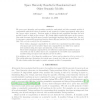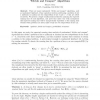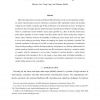128
click to vote
TDSC
2010
14 years 8 months ago
2010
We describe Instruction-Set Randomization (ISR), a general approach for safeguarding systems against any type of code-injection attack. We apply Kerckhoffs' principle to creat...
126
click to vote
ACSAC
2010
IEEE
15 years 3 days ago
2010
IEEE
Instruction-set randomization (ISR) is a technique based on randomizing the "language" understood by a system to protect it from code-injection attacks. Such attacks wer...
106
click to vote
WDAG
2010
Springer
15 years 12 days ago
2010
Springer
Most people believe that renaming is easy: simply choose a name at random; if more than one process selects the same name, then try again. We highlight the issues that occur when t...
113
click to vote
ECCC
2007
15 years 2 months ago
2007
We prove space hierarchy and separation results for randomized and other semantic models of computation with advice where a machine is only required to behave appropriately when g...
157
click to vote
EC
2007
15 years 2 months ago
2007
Randomized search heuristics (e.g., evolutionary algorithms, simulated annealing etc.) are very appealing to practitioners, they are easy to implement and usually provide good per...
IPL
2006
15 years 2 months ago
2006
We show how randomized caches can be used in resource-poor partial-state routers to provide a fair share of bandwidth to short-lived flows that are known as mice when long-lived f...
107
click to vote
JC
2008
15 years 2 months ago
2008
We study the complexity of randomized solution of initial value problems for systems of ordinary differential equations (ODE). The input data are assumed to be -smooth ( = r+ : th...
130
click to vote
DAM
2006
15 years 2 months ago
2006
There are many randomized "divide and conquer" algorithms, such as randomized Quicksort, whose operation involves partitioning a problem of size n uniformly at random int...
110
click to vote
CORR
2010
Springer
15 years 2 months ago
2010
Springer
Recently popularized randomized methods for principal component analysis (PCA) efficiently and reliably produce nearly optimal accuracy -- even on parallel processors -- unlike the...
117
click to vote
CORR
2010
Springer
15 years 2 months ago
2010
Springer
Sphere decoding achieves maximum-likelihood (ML) performance at the cost of exponential complexity; lattice reduction-aided successive interference cancelation (SIC) significantly...




